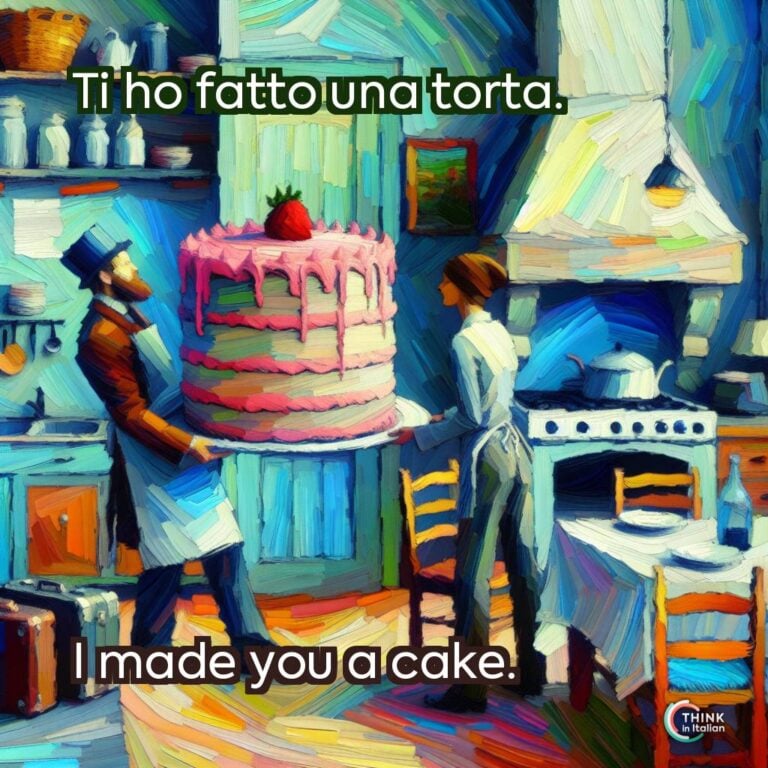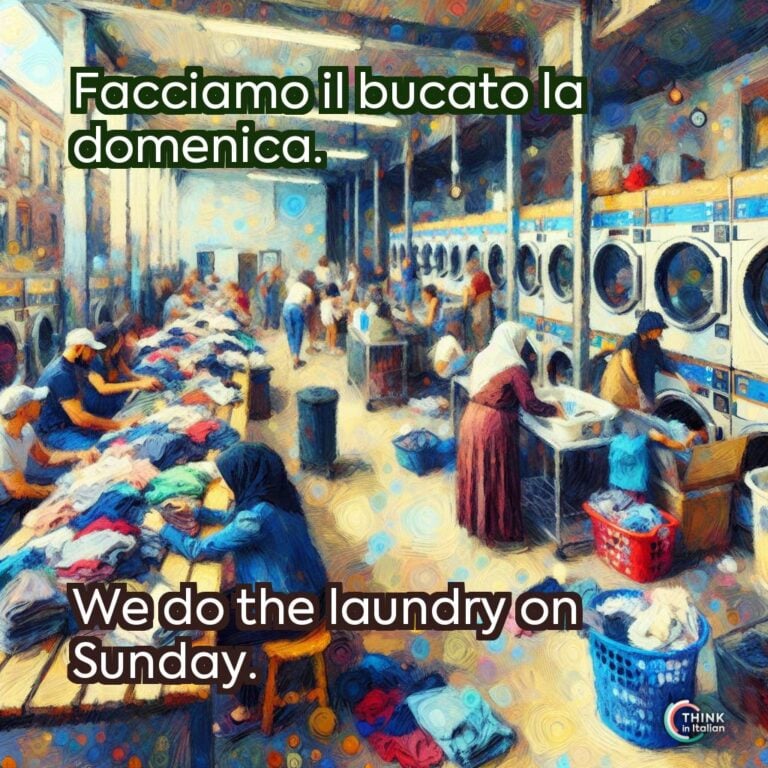What Does “Fare” Mean in Italian
The Italian verb fare is one of the most versatile and widely used verbs whose meanings largely varies depending on its use. Its basic translations are “to do” and “to make”, but it can go far beyond these translations.
If you want to properly learn Italian, you will have to fully understand the various meanings of fare. But first, let me give you some grammatical information.
It is an irregular verb, meaning that it doesn’t follow standard patterns of Italian verbs conjugations. As follows, I will provide you with its conjugation on the indicative present tense:
| Fare |
|---|
| Io faccio |
| Tu fai |
| Lui/lei fa |
| Noi facciamo |
| Voi fate |
| Loro fanno |
An interesting linguistic fact about the Italian verb fare is that, of course, it comes from Latin, specifically from the Latin verb facere, which had the same meaning of “to do” or “to make”.
Over time, as Latin evolved into the various Romance languages, facere underwent phonological changes, leading to the modern fare in Italian.
However, the original Latin form influenced the conjugation and irregular nature of fare, which is the reason why the old Latin root can still be found in some verb tenses, like indicativo imperfetto (indicative imperfect) and congiuntivo imperfetto (imperfect subjunctive).
Although it might be boring for some of you, this is the very reason why I believe that studying the evolution of the Italian language is very useful when learning modern Italian!
“Fare” in Italian
“Fare” as “To Do” or “To Make”
At its most basic, fare means “to do” or “to make”, and it is used in a wide range of everyday actions, for example:
Devo fare i compiti.
I have to do my homework.
Faccio una torta.
I am making a cake.
Che cosa fai oggi?
What are you doing today?
In these examples, fare works similarly to the English verbs “do” or “make” depending on the context. It’s one of the most commonly used verbs in daily life, and it can refer to physical tasks (making a cake) or general activities (doing homework).
“Fare” in Idiomatic Expressions
Italian is full of idiomatic expressions that use fare in ways that don’t always directly translate into English. Here, fare takes on unique meanings in specific phrases that are commonly used.
Fare colazione
To have breakfast
Fare la spesa
To go grocery shopping
Fare una domanda
To ask a question
Fare un viaggio
To take a trip
Fare una passeggiata
To take a walk
Fare la doccia
To take a shower
Fare attenzione
To pay attention
Fare presto
To hurry up
These phrases show how fare often serves functions beyond its literal meaning, embedding itself into expressions that are essential in everyday Italian conversation.
“Fare” to Describe Weather
In Italian, fare is frequently used to describe the weather, where it essentially acts as a substitute for “it is…”. For example:
Fa caldo.
It’s hot.
Fa freddo.
It’s cold.
Notice that it can basically be used only with the nouns caldo (hot) and freddo (cold). If you want to express what the weather is like, you might need to use the verb essere with an adjective, or a verb, as in the examples below:
Oggi è nuvoloso.
Today it is cloudy.
Domani piove.
Tomorrow it rains.
“Fare” in Causative Expressions
Fare is often used in a causative sense, to express the meaning of “to make someone do something“:
Quel film mi ha fatto ridere.
That movie made me laugh.
Mi fai capire la matematica?
Will you make me understand maths?
In linguistics, this type of structure is called causative because it indicates that a person or thing is causing another action to occur by someone or something else. Another example of causative structure is “to let“.
“Fare” as “To Act” or “To Behave”
In certain situations, fare can describe how someone behaves or acts, similar to the English “to act like” or “to pretend“.
Non so cosa fare con lui, fa il difficile.
I do not know that to do with him, he’s acting difficult.
Fai finta di niente.
Pretend like nothing happened.
“Fare” as “To Earn” or “To Charge”
In financial or transactional contexts fare can mean how much something costs or how much someone earns, for example:
A quanto la fai questa maglietta?
At how much are you selling this shirt? (lit: at how much do you do this shirt?)
Quanto fai al mese?
How much do you earn per month?
“Fare” for Measurements or Numbers
Italians use fare when talking about measurements, numbers, or performing calculations:
Due più due fa quattro.
Two plus two equals four.
Vorrei del prosciutto. Me ne fai mezzo chilo?
I’d like some ham. Can you give me half kilo of it?
“Fare” as “To Work as” or “To Perform”
In specific contexts, fare can refer to playing a role, be it professional or not, or performing an action, especially in theater, movies, for example:
Faccio il medico nel film.
I play the doctor in the movie.
Faccio l’insegnante.
I am a teacher/I work as a teacher.






